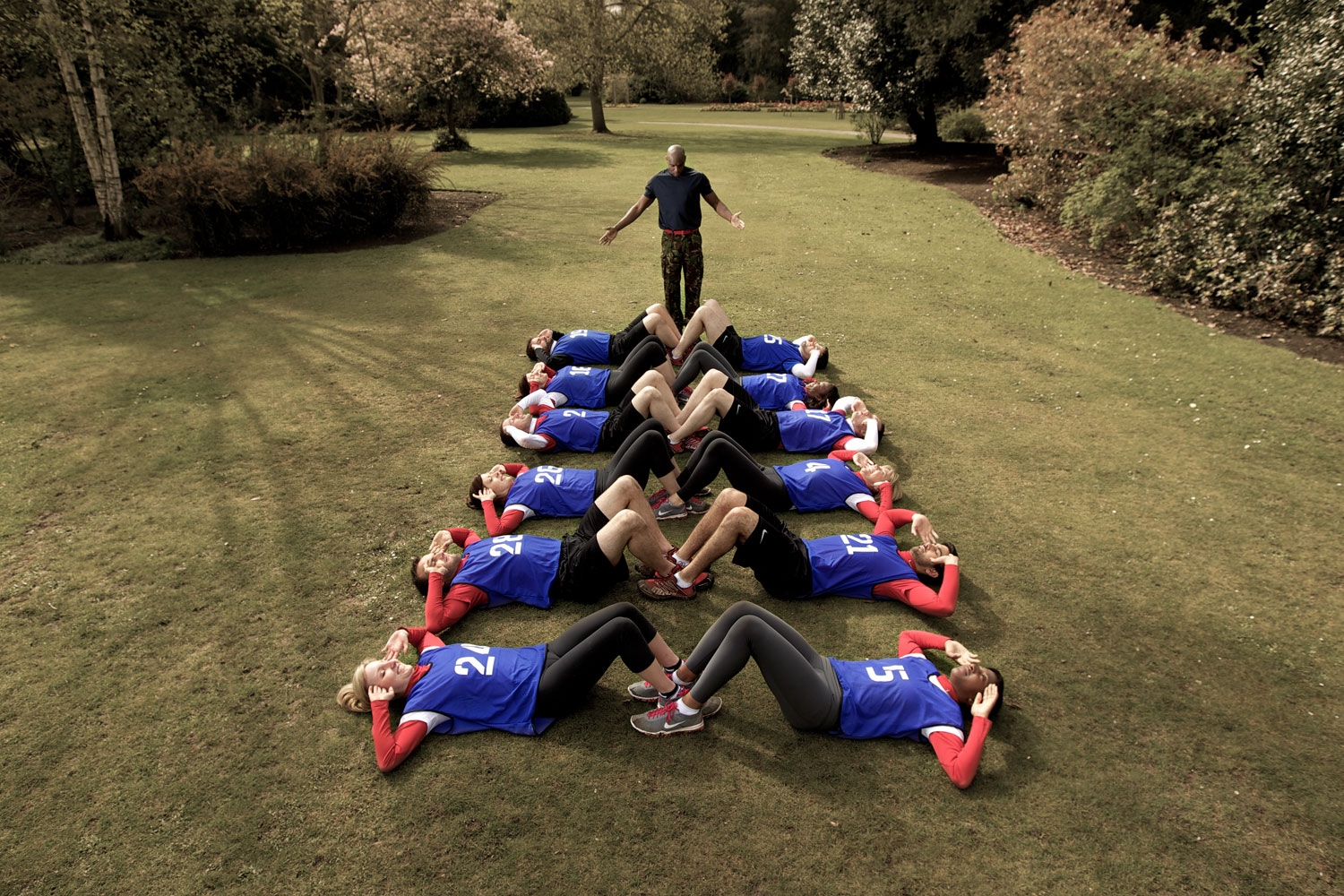Visit the parks of London early in the morning or as the sun sets and it’s as though the city is in preparation for some sort of war. Among the plane trees, groups of shiny-faced young professionals are getting down and giving 20, running back and forth under the watchful eyes of fatigues-clad figures wearing giant military backpacks.
If the shouts they issue sound like something from the parade ground, that’s because they are. These civilian troops are subjecting themselves to a thing called British Military Fitness (‘the UK’s No1 for outdoor fitness’). Started back in 1999 by a retired major, BMF sessions are now held at over 100 locations, each session run by a military-trained instructor. The discipline claims that it is ‘a fun and effective form of training using the highly professional skills learned in the military to get people fit’.
now that our unnatural habitat no longer encourages physical activity, we have to synthesise it
If it seems perverse that this taste of military life is something you might volunteer for, it’s even stranger to contemplate the idea of paying for it. But then the very idea of fitness is a strange and perverted thing. It’s a function of our biological makeup made redundant by our advanced economies: by the division of labour, by supply chains and logistics, by electricity and motors – a situation exacerbated, furthermore, by vastly increased calorific consumption set against decreasing levels of physical activity.
And now that our unnatural habitat no longer encourages physical activity, we have to synthesise it. Hence those fantastic metaphors for the contemporary world: the running machine and the exercise bike. Mile after mile, going nowhere fast.
In this context, military fitness might represent a kind of authenticity – something raw and honest dropped into the cultivated urban parkland. In it we might hope to find the sort of bluntness that modern life never offers us, preferring instead to butter us up, sweet-talk us, and otherwise douse us in saccharine promises.
The running machine is a fantastic metaphor for the contemporary world: going nowhere fast
With its military tints of brutal square-bashing, ‘scientific’ training regimes and ruthless discipline, BMF is a fantasy we can participate in, a set of actions we can put our bodies through so that we feel the fantasy within the sinews of our muscle tissue.
But it’s just one of many themed versions of fitness that we are offered. Take Nike’s Run to the Beat, a half-marathon organised by the sportswear giant that’s studded with DJ’s and finishes at a ‘festival’. Run to the Beat takes the hazy tradition of all those Woodstocks, Glastonburys and Burning Mans and rinses it clean.
It has all their sensations of youthful energy but edits out the Class A drugs and the waking up in a half-collapsed tent with a falafel stuck to your cheek. Corporate events such as these wrap up fundamental physiology in slogans, garish colourways and performance fabrics, in such a manner that it feels like a lot more than just putting one leg in front of another for a very long time.
fitness is an idea about what it means to have a human body in the twenty-first century
Elsewhere, you can join groups that run around and perform the kinds of public-spirited things you’d ordinarily find orange-boilersuited offenders doing as a consequence of their community service orders. You can cover the city on high-speed architectural tours. You can gloss your activity with mysticism as though it were a form of meditation or a way of communing with nature.
You can head down to a club opening its doors in the early morning to ‘rave your way into the day’ at Morning Glory, an event that’s ‘definitely not an afterparty’ but a (sober) prework dance workout. And you can associate the workout with do-gooding, as any one of those emails from distant acquaintances asking you to sponsor a run can attest. And while a fitter population is nothing to complain about, it’s no stretch to see why a sportswear brand might want to sell to those of us who are far from specialist.
Much more than a painful route to a functioning cardiovascular system and a trim waistline, fitness is an idea about what it means to have a human body in the twenty-first century. It represents a morality play about choice, self-control and motivation. It’s about the cults of health and youth, about the blissful states of energy and self-fulfilment.
But perhaps, most of all, it’s about how the simple actions of our bodies can be rescripted by cultural forces, how moving your arms and legs and pumping blood around your body can become a vehicle for cultural myths and corporate messages.
This article was first published in the October 2013 issue.
